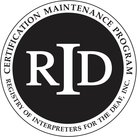The interpreting profession
What is interpreting?
Interpreting is a challenging and rewarding career. It requires skill and interest in both English and ASL, a passion for lifelong learning, and a desire to assist others who want to interact and communicate. As a Coda, you have a lifetime of experience with the Deaf community and exposure to sign language. This puts you in a unique position to pursue the career of interpreting.
|
As an interpreter, you may interpret lectures, one-on-one meetings or group meetings. You also have to follow a professional Code of Conduct. One of its most important components is to maintain confidentiality. This means keeping private whatever happens in the interactions that are interpreted. Interpreters work in a variety of settings such as:
|
Interpreters are needed when people who do not know the same language, in this case, Deaf and hearing individuals, have a need to interact. They may need to communicate for a variety of reasons, for health care appointments, for conducting business, or getting an education, among many other reasons. Interpreters facilitate communication in these interactions.
|
Visit the Discover Interpreting website to learn even more about interpreting as a career: http://discoverinterpreting.com
The Registry of Interpreters for the Deaf
|
The Registry of Interpreters for the Deaf (RID) is the professional organization for ASL-English interpreters. They have established national standards for quality assurance of services by providing certification for interpreters. They have also developed ethical guidelines for interpreters, the Code of Professional Conduct (CPC). Learn more about RID: www.rid.org.
Part of the Code of Professional Conduct is continuing education and development of interpreting skill, and RID provides a professional development conference every two years. |
State certification requirements
|
Each state has their own requirements for interpreters to be able to work professionally. Don't know your state requirements? RID has provided information on each state. Visit their website to find out: http://rid.org/advocacy-overview/state-information-and-advocacy/. This page also lists local interpreting associations, Deaf associations and other important organizations for interpreters in each state. |
Types of certification exams:
Educational Interpreter Performance Assessment (EIPA). Many states require this specific assessment for working in elementary and secondary classrooms with Deaf students. Each state has different requirements for the minimum score an interpreter must obtain on the EIPA in order to work as an educational interpreter. Check your state certification requirements to see what the required minimum score is in your state.
State Quality Assurance Exams. Many states offer a certification other than the RID certification test. They may have developed their own certification exam, or use the Texas-developed Board for Evaluation of Interpreters exam, known as the BEI.
Educational Interpreter Performance Assessment (EIPA). Many states require this specific assessment for working in elementary and secondary classrooms with Deaf students. Each state has different requirements for the minimum score an interpreter must obtain on the EIPA in order to work as an educational interpreter. Check your state certification requirements to see what the required minimum score is in your state.
State Quality Assurance Exams. Many states offer a certification other than the RID certification test. They may have developed their own certification exam, or use the Texas-developed Board for Evaluation of Interpreters exam, known as the BEI.
Work requirements
Depending on the setting in which you choose to work as an interpreter, there may be restrictions other than certification that you should be aware of. Some employers such as elementary and secondary schools or video relay providers may require:
- background checks
- drug screenings
- covering visible tattoos
- removing any visible piercings other than earrings
- specific dress code, including hairstyle



